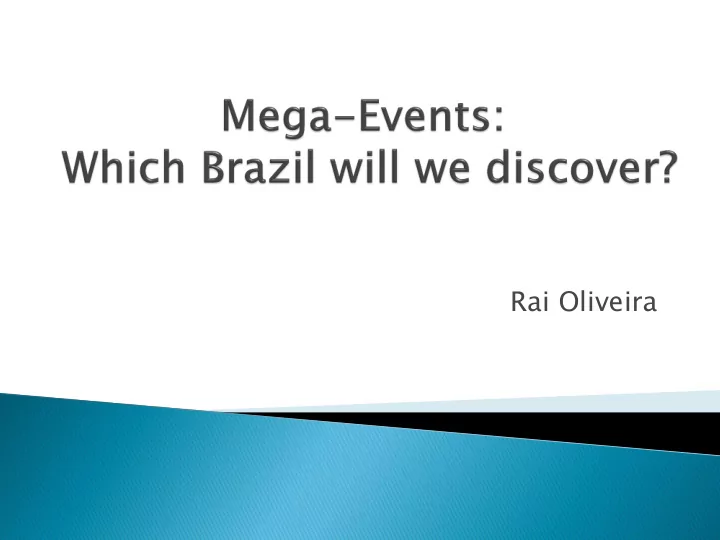

Rai Oliveira
What sort of Brazil will we see in 2014 and 2016?
The world’s 7th greatest economy or one the most inequitable countries on the planet?
Corruption vs Rise in income of the new middle class The best hospitals in Latin America vs Shame of inadequate public health care Racial integration vs class prejudice Sporting vocation vs football and a few other elite sports
Even we Brazilians are largely unaware of the way we’ll host events. There’s no doubt that we have the capability of hosting a well-organized, high-tech and ecologically responsible event, but it could also be one that exposes the limitations of our infrastructure and just gambles on our festive spirit.
Lagging behind in several aspects Lack of adequate debate Lack of a wider participation in the decision-making process
Setting a benchmark Establishing a goal An opportunity to raise Brazil to a new level a m a more re mat ature re society ciety on the e way ay to eliminating minating its contrad ntradictio ictions ns
Brazil is still in the splendor of its democratic youth 3 decades after regaining democracy after 25 years of dictatorship Social movements and organizations are beginning to build the base of a new Brazilian society
Chronological references Set the pace and standard for new conquests High expectations with great sense of pride. Provoking acceleration in this whole ‘wave’ of social al mobilizat izatio ion n and thirst rst for conqu ques est.
Independent of the cause: Education Sport Health Anti-corruption Establish goals and initiate concrete actions: Brazil azil of of the the fu futu ture
‘ Instit stituto uto Ethos’ (Ethos Institute ) ◦ resources via the World Bank to accompany developments and ensure transparency. ‘ Ci Cidades ades Suste tentá ntávei eis ’ (Sustainable Cities) ◦ made movements to guarantee social participation in public sector management. ‘ To Todos os pel ela Ed Educaça caçao ’ (All For Education) ◦ a great mobilization for improvements in Education ‘ Atlet etas as pel ela Ci Cidadani adania ’ (Athletes for Citizenship)
Romantic vision compared to the economic and political interests of the small groups Private interests above the public benefit
Whic ich are re the opport rtun unitie ities s that I see e fo for t r the e fu future re of Spo f Sport rt in in Bra razil il? ? Sp Sport rt fo for al r all! l!
Potential and vocation for sporting Not represented in our everyday reality. Investment in sport will be directed towards high-performance and high-profit sport: followi wing ng the poor vi vision n and d blink nker ered ed focus us on short ort-ter term m rew ewards. ards.
Sport contains people taking part in movements for change. Mainly the athletes who are already engaged in the field of social action ‘ Gol de Letra ’, ◦ based in poor neighbourhoods, ◦ Almost 13 years - Atletas pela Cidadania ’ ◦ a pioneering initiative.
A non-profit organization made up of both athletes and former athletes Inform & Create awareness Mobilize society Promotion of citizenship and social development through the activities of well-known Brazilian athletes.
Our strategy is one of advocacy, a 'lobbying' for the public good. A non-party political action with strategies specifically designed to amplify their power for transformation through action at grass- roots level.
Wide range of athletes and former athletes All types of sporting backgrounds Different generations Uniting for the first time in order to defend their country and social policies.
Our goals ls are: To use our experience to promote the importance of ‘Sport for development’. To put together a proposition for a national sports policy that enables the participation of each and every citizen. To double the physical activity rate in the 12 host cities of the world Cup � by 2014 and in whole Brazil by 2022 � To guarantee that 80% of public schools have high quality sporting programs by 2016 and.. 100% by 2022.
Current rent Situat atio ion 16% of the adult population get enough physical exercise in Brazil 21% don't have a physical education teacher 18% of the public elementary school have sports facilities ◦ Minas Gerais 98% ◦ Piaui 31% ◦ Maranhao 3% ◦ Sao Paulo 54% Video
BRING CHANGE TO THE HEART OF SPORT TH THANK NK YOU U I HO HOPE PE THA HAT THE HE SPO PORT RT WI WILL L CHA HANGE GE THE HE HE HEART OF MY COUNTRY! RY! Rai Oliveira October 2011
Recommend
More recommend